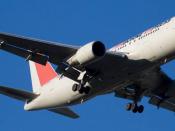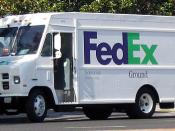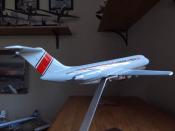Airborne's philosophy, "we can't be all things to all people", allowed it to profitably target the business customers that regularly shipped a large volume of urgent items. It provided courier services to businesses rather than pursuing the residential and infrequent shippers. This strategy allowed Airborne to utilize its strengths in serving a specific market segment and avoid large scale investment to develop a gamut of processes in order to satisfy all type of customers. This customer focus strategy allowed Airborne to avoid costs related to mass media advertisement. Instead, the company formed a sales force of 500 people who courted the logistics managers of major shippers. Exhibit 1 shows that the total cost of sales and marketing was just $0.18 per overnight package as compared to $0.43 for FedEx.
Delivery Timings: Shippers and recipients of Airborne parcels were concentrated in major metropolitan areas (80%-85% of its volume was shipped between top 50 metropolitan areas compared to 60% and below for FedEx and UPS respectively).
Unlike FedEx, a greater portion of Airborne's volume consisted of afternoon and second day deliveries. As a result, Airborne could use trucks more often than its competitors for the long haul portion of the delivery. The operating cost for trucks is one third lower than the cost of operating and owning similar amount of aircraft capacity. Around 30% of the Airborne's volume never saw the inside of the airplane, as opposed to 15% for FedEx. This reduction in cost is reflected in "Long-haul Transport" in Exhibit 1.
Pickup and Delivery Activities: First of all, Airborne did not maintain any retail service centers. Secondly, Airborne owned a very small portion of its delivery vans. It had outsourced around 60-65% of its delivery activities to independent contractors, who were paid either on per mile or...


